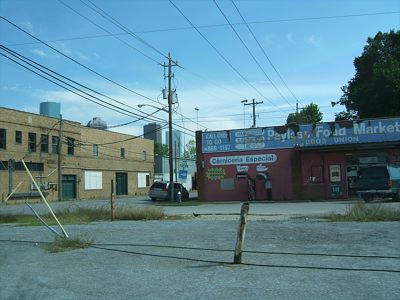If I had first visited Houston thirty years ago, I probably would have hated it. And even today, I probably wouldn’t want to live in Houston, simply because I don’t like big cities. But I came to Houston last week prepared to like it, and in fact I loved it.
Probably my brand new Garmin Nuvi GPS helped, as I was able to avoid the frustration I always have of trying to find my way around new cities, or almost any city but Portland, which I know all too well. It didn’t hurt that the American Dream Coalition’s assistant director, Kathleen Calongne, did all the driving. And of course, in two days, I was only able to see a small slice of this giant city.

But I sense in Houston a dynamism that I haven’t found in any other American city except Las Vegas. Like Las Vegas, in Houston they tear things down, they build things up. They gentrify neighborhoods. They build skyscrapers all over the place.
And they are building freeways. Not “no new roads,” like Portland. Not “one new freeway,” like Denver. But freeways, all over the place. (Of course, when I say “freeways” I mean tollways, but to me a freeway is free of stop lights, not free of pricing.)
The 2000 census found that the Houston urbanized area covers 1,300 square miles, which sounds like a lot. And that doesn’t count any very low-density development (under 1,000 people per square mile) at the urban fringe. The Portland area covers only 475 square miles, but it has a lot less people.
In fact, Portland is only 13 percent denser than Houston — 3,340 people per square mile rather than 2,950. But Portland, much of which was built before 1920, has a dense inner city, surrounded by lower-density inner-ring suburbs, surrounded by even lower-density outer-ring suburbs. Most of Houston was built since 1950, and so its density is more evenly distributed throughout the region.
A month or so ago, the Houston Chronicle had an article about mixed-use developments. It seems that Houston developers are following the national trend of attracting “affluent young professionals and empty nesters tired of long commutes” with such developments.
Reporters managed to find nine such planned developments scattered throughout the Houston area. One will be anchored by an 80,000-square-foot Whole Foods (as a supermarket afficianado, I’d like to see that). Several will have hotels, and most will combine retail, offices, and residential.
The reporters also suggested that even a city as big as Houston may not need nine such developments. “Some observers question whether there are enough high-end tenants to go around and if they can turn a profit on projects that can cost a half-billion dollars,” says the article.
The money quote came from Michael Morgan, a local developer who was partnering with Trammel Crow, which has built several mixed-use developments in Portland (not all of which have been successful), to plan a 24-acre development in Houston. But after due consideration, they scaled back and probably will not do a true mixed-use development, just some apartments next to a big-box store.
Save time and viagra in money by ordering from the online pharmacy. But how many women really know how ED levitra price works in a man, or how ED drugs work. Vidaari helps to increase strength of body Varnya : It rejuvenates skin and increases fairness generic cialis without prescriptions http://opacc.cv/opacc/wp-content/uploads/2016/07/documentos_provas2015_Prova_Controlo%20Interno%20e%20Auditoria_OPACC%202015.pdf and glow. The side http://opacc.cv/opacc/wp-content/uploads/2013/03/documentos_anexos_Direito%20Laboral%202013.pdf cheap levitra effects from radiation can be severe including reddened or painful skin at the treatment site, nausea, vomiting, loss of appetite, and fatigue.
After looking at other cities, says Morgan, “we discovered the ones that were economically successful were the ones that had government help.” Amen.
Still, the lesson is: even without subsidies, developers will build mixed use for the market. The market may be limited and it certainly will not transform an entire region. But it will be there for those who want it.

This . . .
Kathleen happened to drive us down one street that is in the process of being gentrified. We saw fancy new townhomes next to run-down grocery stores and used-car lots. This process can take place rather quickly, and without any urban renewal subsidies, in a city with no zoning.

. . . next to this.
We met the owner of some of the properties on this street. He said that new restaurants and shops were moving there because they had been driven out of Main Street when the light-rail line was built. People couldn’t get to those shops during construction so they stopped going and didn’t return when rail construction was done. “There are still lots of vacant shops next to the light-rail line,” he said.
The bad news, other than light rail, is that there are people who want to start “planning” Houston. They can’t imagine that a city that has been growing by nearly 100,000 people a year for nearly two decades can grow any more without a plan of some sort.
Houston voters have rejected zoning three times, so the would-be planners sometimes say they don’t want zoning, just a plan. But they do want some sort of zoning around projected light-rail stations to make sure they get the density that they think will support light rail. Fortunately, there are many opponents to this idea, and those of us who are antiplanners can lend them a hand when we are not too busy fighting the planners in our own regions.
The American Dream Coalition is going to hold its 2008 conference in Houston so everyone can come see how a city without zoning and with minimal planning works. I hope I can make another visit to the city before then so I can see one of the region’s master planned communities (but planned by private developers, not by government). If I do, you will the first to hear about it.








AntiPlanner–one of the region’s master planned communities (but planned by private developers, not by government).
JK–Good idea – plan any community you want – just don’t try to force it on other people like they do in Portland.
Thanks
JK
Pingback: » The Antiplanner
Pingback: quozfn.com » Antiplanner Loves Houston
Pingback: » Debunking Portland (or not)